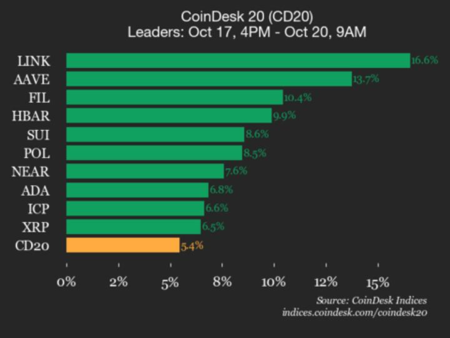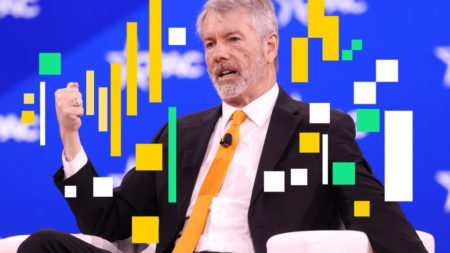Andrew Cuomo’s Crypto Pivot: An Analysis of its Impact on NYC’s Mayoral Race
In the competitive landscape of New York City’s mayoral election, former Governor Andrew Cuomo’s recent pivot towards cryptocurrency has been widely discussed. With aspirations to establish New York as the “world capital” for crypto and decentralized finance (DeFi), Cuomo’s strategy aims to galvanize potential voters and position himself as a leading voice in the tech-savvy realm. Yet, despite this bold vision, current market indicators reveal limited support for his campaign, prompting critical questions regarding the efficacy of his move.
Understanding Cuomo’s Crypto Strategy
On October 19th, Andrew Cuomo articulated a vision that entwined the future of New York City with the burgeoning fields of artificial intelligence (AI), blockchain technology, and biotechnology. His announcement included the creation of a Chief Innovation Officer (CIO) role, designed to steer initiatives that could thrust New York into the forefront of technological innovation. The emphasis is clear: Cuomo believes that the next mayor must ensure the city remains competitive and dominant in the global innovation economy. His remarks outline a detailed strategy, which rests on cultivating a network of experts in various tech fields to help actualize this ambition.
The Election Landscape: Cuomo vs. Mamdani
While Cuomo’s crypto ambitions are grand, the immediate electoral reality is stark: Polymarket currently gives him only a 6% chance of winning the mayoral election, while his chief competitor, Zohran Mamdani, holds a substantial lead with a 93% likelihood of success. This discrepancy raises pertinent questions about the true impact of Cuomo’s crypto pivot on his potential to sway voters. The political arena has increasingly become intertwined with tech interests; however, the effectiveness of adopting crypto narratives depends significantly on public perception and sentiment, which currently appears muted.
The Role of Crypto in U.S. Politics
The political landscape in the United States has shifted substantially with the influence of cryptocurrency. High-profile endorsements, like those of Donald Trump, have highlighted the financial muscle and voting power that the crypto industry can wield. In the 2024 U.S. presidential elections, crypto advocacy has become a double-edged sword—offering opportunities for candidates to garner significant financial backing while also presenting challenges, such as navigating public skepticism. Some Democratic candidates, like Senator Reuben Gallego, have also benefitted from crypto lobbies, potentially reshaping how candidates align their policies with issues directly related to digital currencies.
Criticism and Controversies Surrounding Cuomo
Despite some support from pro-crypto individuals, Cuomo’s connections to the cryptocurrency sector have not escaped scrutiny. Mamdani has leveled severe critiques regarding Cuomo’s possible conflicts of interest, suggesting that he operates more as a lobbyist for the crypto industry than as an independent candidate. Additionally, the implications of Cuomo’s role in the $500 million settlement involving the exchange OKX could signal deeper entanglements in the crypto realm that voters might view as problematic. While the crypto community may stand behind him, more extensive market sentiment reveals hesitance regarding his candidacy.
The Current Climate of Digital Assets in New York
New York has a robust digital asset sector, heavily regulated by the Department of Financial Services (NYDFS), which has taken significant steps to ensure user protection and industry oversight. Recently, the NYDFS granted approval for Ripple’s stablecoin RLUSD, showcasing a proactive approach to fostering fintech innovations within a tightly regulated environment. Thus, while Cuomo’s pivot aligns with the city’s overarching strategy to embrace tech, his chances against a candidate who has successfully sparked a more youthful, progressive energy like Mamdani may prove complicated.
Conclusion: A Pivotal Moment for Cuomo’s Campaign?
Cuomo’s shift towards cryptocurrency represents a significant gamble in the challenging arena of the New York City mayoral race. While articulating a forward-thinking, tech-driven vision has its merits, the tangible electoral outcomes suggest that his strategy may be falling short. As of now, his odds remain low in the face of a formidable opponent who has effectively criticized his approach. The intersection of crypto advocacy and political ambitions serves not only to demonstrate the evolving landscape of American politics but also to highlight the perils of navigating such a volatile terrain. Moving forward, it remains essential to monitor both public sentiment and regulatory developments that will undoubtedly shape the future of digital finance in New York City and beyond.


![Synthetix [SNX] Soars 25% with $57 Million Inflow: Are Investors Getting Greedy?](https://cryptonewsinsiders.com/wp-content/uploads/2025/10/snx-1000x600-300x180.png)







![Synthetix [SNX] Soars 25% with $57 Million Inflow: Are Investors Getting Greedy?](https://cryptonewsinsiders.com/wp-content/uploads/2025/10/snx-1000x600-450x270.png)






